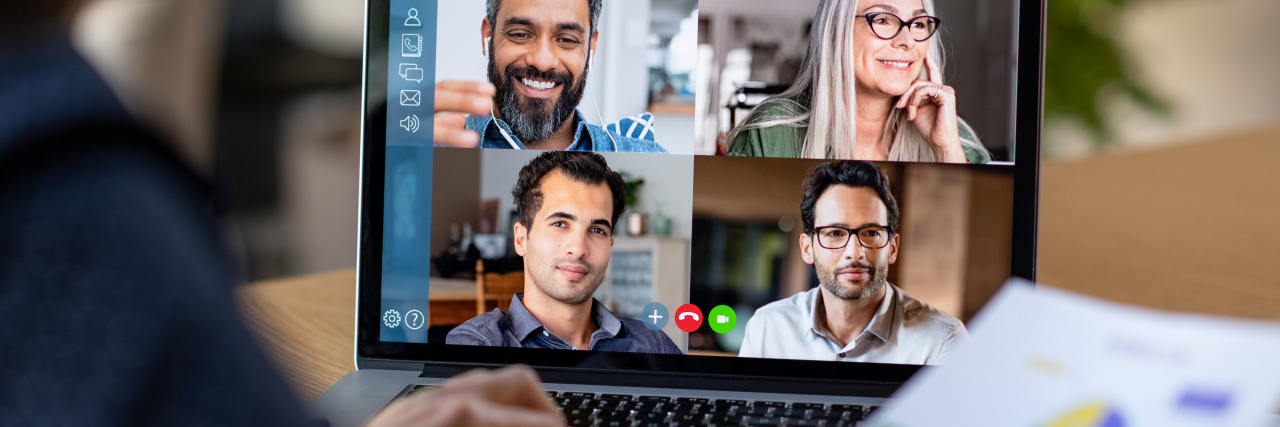Learning From the Wisdom of the Disabled Community During COVID-19
Editor's Note
Join The Mighty’s Coronavirus group to connect with other Mighties living through the pandemic. Read the latest updates, share helpful tips, or give and receive virtual support.
Recently, I’ve been a part of many conversations in the disability community about how, in many ways, the current pandemic has actually made it easier for us to work, shop and engage with others. A few months ago, the world was suddenly plunged into a situation where our normal was turned upside down, and we had to reimagine a new way of doing, being and belonging in the world.
For many people, working from home, video conferencing, online shopping and the like became their new normal. I’ll pause here and say that this has been my normal, and the normal for many folks with disabilities for years. Whether it is because we feel a greater sense of ease in virtual rather than physical space, or physical spaces aren’t accessible, or we cannot locate a support person to accompany us to an event, all of these are reasons we might opt to engage in the virtual world.
This led me to think about how the current environment is leading to disability accommodations becoming widely available, not because of some ethical awakening or increased empathy but because now everyone is disabled. If we follow the logic of the social model of disability, we are now working in an environment that is not ideal for the vast majority rather than an unseen minority. I will share some key examples.
Zoom fatigue is the new widespread irritation of working people everywhere. Not all communication is ideally suited to video format. It can be hard to read body language and know when it’s your turn to speak. There can also be technical problems preventing you from hearing or being able to connect with someone over an urgent matter. Connecting and communicating seamlessly with others is a privilege not afforded to many people with certain types of communication, visual, or hearing disabilities, and difficulty accessing information and communicating is our reality.
No doubt after the crisis, the majority of people will be enormously grateful to return to having certain communication face to face. But deaf and hearing-impaired people will still be receiving their medical sign language interpretation via a tablet, people with visual disabilities will still receive paper-based forms to complete, and those living with communication disabilities will struggle to be heard and understood.
During this time where we are struggling so much to feel connected to others, perhaps we can review how disabling our society is to hearing-impaired people and those who live with visual and other communication disabilities.
Some people are currently uncomfortable wearing masks, either because the mask obstructs hearing and sight, or the mask is claustrophobic or anxiety-inducing. It also may not be possible for folks with specific types of physical disabilities to independently put on and take off a mask. It’s not a resistance to the rules that’s the problem, it’s a genuine physical reaction. Surely accommodations can be made.
The literal isolation from society that is causing you to feel lonely and disconnected is how it feels for many of us who are simply not included or accepted because of our differences. Loneliness is a huge problem for disabled people and takes its toll on our mental health. Now that we all know better, we must do more to help.
Flexibility Will Be the Key
For those who have found working from home and the absence of a commute positively liberating, let’s remember that when lockdown restrictions are eased, we don’t have to spring back to business as usual. It will be much harder to argue that remote working is “unreasonable” as a disability adjustment, and we should note the productivity gains of our less extroverted colleagues right now.
As business leaders planning a return to work, we can sort the last few weeks into categories:
- What worked well
- What was tricky
- What would we like to do differently
Let’s notice those who have thrived at this time and allow them to keep their working conditions.
Let’s remember how much effort we put into technology in this time, such as alt-text for images, so those who rely on technology for all communication feel included.
Let’s keep all these options open once we regain the freedom to choose.
During this time, I call on leaders and decision-makers to review the ways in which we are now disadvantaged, and use this increased insight and empathy to review what changes could and should be made to support the disabled community, both during the pandemic and post-pandemic.
For more on the coronavirus, check out the following stories from our community:
- The Problem With Saying ‘Only’ the Elderly and Immunocompromised Will Be Affected by COVID-19
- If I Get COVID-19 It Might Be Ableism – Not the Virus – That Kills Me
- How America’s COVID-19 Response Is Exposing Systemic Ableism
- Why I’m Worried About Rationing If My Child With Down Syndrome Gets COVID-19
- I’m Afraid I’ll Be Told to ‘Sacrifice’ My Health for COVID-19 Patients
Getty image by Ridofranz.

